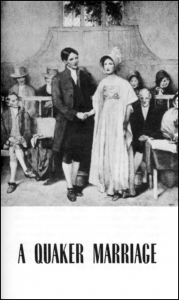The early Lawrences were mostly or perhaps entirely Quakers, but gradually became Episcopalian.
One of the causes for the change in denomination was the Quaker prohibition of marrying non-Quakers.
As early as 1694 Philadelphia Meeting advised:
Take heed of giving your sons and daughters who are believers and profess and confess the truth, in marriage with unbelievers; for that was forbidden in all ages…it is unbecoming those who profess the truth to go from one woman to another, and keep company and sit together, especially in the night season, spending their time in idle discourse, and drawing the affections one of another many times when there is no reality in it.
The guilty party had to demonstrate repentance, or was in effect excommunicated:
Marrying out [of the faith] is believed to have caused immense losses in Quaker numbers after 1740. In Quaker records there are notations that someone “married out of unity” or “mou” – this indicated that they married someone not of the Quaker faith. It would be necessary to make amends in writing to the satisfaction of a committee of members of the monthly meeting if they wished to remain Quakers. Sometimes the spouse adopted the Quaker faith and was received by request (rcrq). If the Quakers were unwilling to make amends for their actions they would be dismissed from the monthly meeting.
The prohibition against marrying out helps explain the tendency of the Lawrences to marry their cousins. There were only a few Quaker families in New York, and they quickly became interrelated and entangled.
Of Effingham Watson Lawrence (1795-1872), Friends records indicate that he was dismissed for “marrying out: in January, 1824, His wife was Rebecca Prince, after that must have become an Episcopalian, or at least was agreeably to sending his son Francis Effingham, to an Episcopal school, an experience that led Francis to become a disciple of Muhlenberg, a priest, and rector of the Church of the Holy Communion.
But even marrying a Quaker cousin was not always sufficient because of the Hicksite-Orthodox split. After they Hicksite-Orthodox split in the Quakers, the prohibition was applied to the wrong sort of Quaker. As we have seen, Newbold Lawrence and Anna Hough Trotter were both Quakers, but of different persuasions, and they compromised by marrying in an Episcopal church and their descendents were Episcopalians.
However, Quaker influences remained important in the family, as we shall see.
